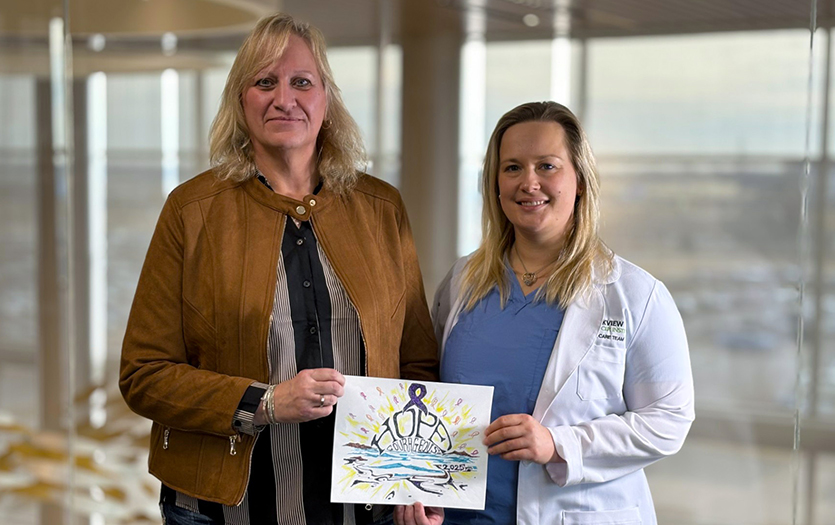
The breast cancer death rate fell 39 percent from 1990 to 2014, and overall, the survival rate for cancer patients has increased from 50 percent in 1975 to 68 percent in 2016. Because of these statistics, and trends toward a more holistic approach to patient care, Breck Hunnicutt, NP, is dedicated to helping patients navigate their cancer journey, in its entirety.
Better outcomes
The increase in cancer survivorship is attributed to several factors, but there are some that stand out.
Decreased smoking rate
- 42 percent of adults in 1965 to 15 percent in 2014
- 30 percent of high school students in 1999 to 8 percent in 2016
Increased screening
- Leads to early detection
Improved treatment regimens
Who is a cancer survivor?
An individual is considered a survivor from the time of diagnosis for the duration of their life. The National Cancer Institute Office of Cancer Survivorship says that survivorship focuses on the health and life of a person with cancer post treatment until the end of life, including their family and friends.
Elements of survivorship care
Parkview is dedicated to assisting patients throughout their journey, from treatment to remission, in six key areas.
1. Surveillance
- Comprehensive history and physical to assess for recurrence or progression
- Assist in coordination follow up care and ensure all components of surveillance are completed
- Evaluate risk and need for genetic testing of patient and/or family
- Evaluate adherence to endocrine therapy
- Ensure patient understands and adheres to surveillance plan according to National Comprehensive Cancer Network (NCCN) guidelines
- Breast imaging annually
- Self-breast awareness - educate on reportable signs
- Clinical breast exam 1-4 times a year
2. Screening for secondary primary cancers
- Lung Cancer
- SmartLung Scan annually for those who meet requirement
- Cervical cancer
- PAP smear every 3 years from 21-29 years of age
- PAP and HPV every 5 years from 30-65 years of age (PAP alone every 3 years)
- Colon Cancer
- Colonoscopy starting at age 50 and then every 10 years to age 75
- CT colonography every 5 years
- FIT annually
- Skin Cancer
- Self-surveillance
- Sunscreen
3. Assessment and management of physical, psychosocial long-term and late effects of breast cancer and treatment
MIND
- Body image
- Breast prosthesis, scar massage, wigs, plastic surgery, psychosocial support, nipple tattoo
- Breast prosthesis, scar massage, wigs, plastic surgery, psychosocial support, nipple tattoo
- Distress, anxiety, depression and fear of recurrence
- Discussion about anxiety management
- Refer to in-house counseling with oncology focus
- Assessment with PQ – GAD-7 if applicable
- Referral to counseling
- Pharmacotherapy
- Post-Traumatic Stress Disorder (PTSD)
- Counseling LCSW, psychiatry, post-traumatic growth
- Counseling LCSW, psychiatry, post-traumatic growth
- Insomnia
- Sleep hygiene
- Anxiety management
BODY
- Fatigue
- Test for fatigue with TSH, CBC, vitamin D, Cardio
- Treat insomnia, sleep apnea, depression, pain
- Engage in physical activity
- Refer to cognitive behavioral therapy
- Bone health
- Dexa scan for postmenopausal women taking aromatase inhibitor or Tamoxifen and premenopausal women taking Tamoxifen
- Weight bearing exercises
- Calcium and vitamin D
- Bone building agents if osteopenia and on aromatase inhibitors
- Hot flashes
- Avoidance of spicy foods, caffeine, alcohol
- SNRI
- SSRI
- Gabapentin
Pain and neuropathy
- Pharmaceutical therapy, Acetaminophen, NSAID, Cymbalta
- Acupuncture
- Physical therapy/occupational therapist
Sexual health
- Vaginal dryness-vaginal moisturizers and lubricants
- Discussion about intimacy
- Physical therapy - pelvic floor
- Laser therapy
- Assuring there is nothing wrong with them
- Referral to sexual counselor
- Referral to partner counselor
Lymphedema
- Prevent-weight loss, exercise
- Treatment - physical therapy
Cardiotoxicity
- Prevention: lifestyle, report symptoms
- Evaluate: echocardiogram, EKG, lipids
SPIRIT
- Anger, grief, meaning of life, loss of control
- Hope
- Clergy
4. Health promotion/risk reduction
- Obesity
- Physical activity
- Nutrition
- Smoking cessation
- Alcohol intake
- Vaccines
5. Care Coordination
- Multidisciplinary (Oncologist, PCP, Pain Management, Integrative, Cardiology, Endocrinology, Pulmonology, APP, PT/OT, Nutrition, Exercise specialist, Psychology, financial counselor)
6. Communication



